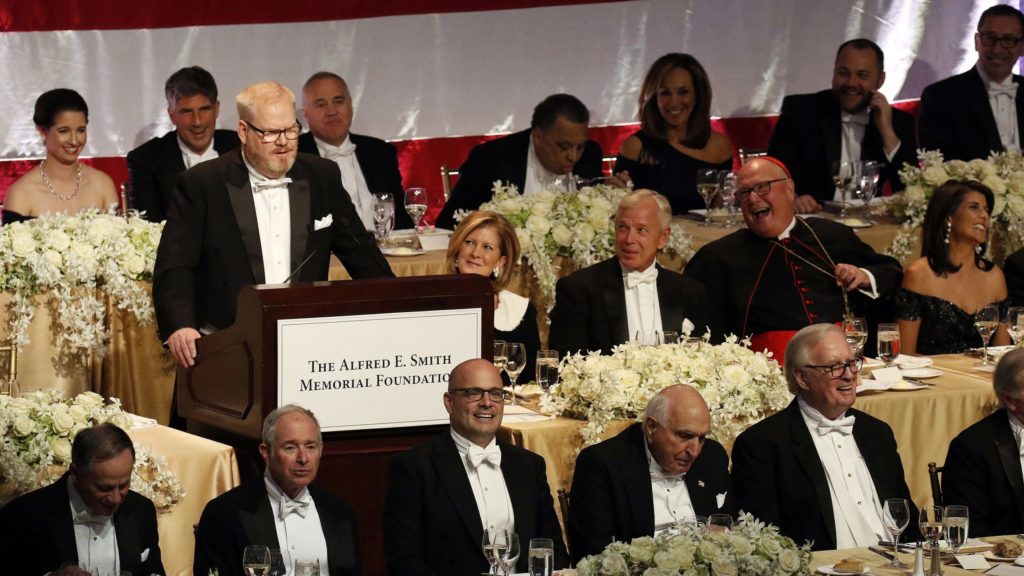There’s an episode of the 2000s political drama West Wing titled “The Al Smith Dinner,” where the two presidential nominees have trepidation about attending the Archdiocese of New York’s charitable event, but ultimately decide to attend.
Over the weekend, Vice President Kamala Harris’ campaign announced that she would not attend this year’s Al Smith Dinner – the first time in 40 years a presidential candidate has declined the invitation. While the situations aren’t parallel, multiple political experts from New York Catholic universities referenced the episode in their reactions to the news.
Brian Browne, an assistant vice president for government relations at St. John’s University who has attended multiple Al Smith Dinners, didn’t make any parallels between the present situation and the West Wing episode that aired in 2005, but called Harris’ decision not to attend “puzzling.”
Browne noted that the Al Smith Dinner is “a great, great event” that wouldn’t put Harris in a situation where there’s unscripted moments, as her campaign has been trying to avoid. It would also allow her to interact with the largely Catholic and wealthy crowd, which he said wouldn’t hurt her politically, either.
“Given she’s the Democratic candidate, she would have access to the best joke writers on the east coast and the west coast who would love the opportunity to write a script. It’s a very scripted event,” Browne said. “I know she seems to be very dependent on a teleprompter, but it’s a teleprompter event. Yes, you might get some groans if your jokes don’t land, but you’re not going to get booed off the stage or heckled. It’s always this kind of coming together type of moment.”
“It’s a missed opportunity to demonstrate a human side and come together for a charitable cause, and you know, if I was advising her, I would tell her to reconsider this,” he added, noting an already special event is even more special when both major party candidates are there.
Established in 1946 and formally known as the Alfred Smith Memorial Foundation Dinner, the event honors the memory of the former four-term governor of New York who was a Democrat and the first Catholic to be nominated by a major party in 1928, though he was defeated by Herbert Hoover.
Hosted by the Archdiocese of New York, the event raises millions of dollars for Catholic Charities, and is historically an evening for the candidates to put politics aside and come together in a more lighthearted manner for a good cause.
For that reason, Browne, who is also the executive director for university relations at St. John’s, said that Harris’ absence is a missed opportunity for the American people to see both presidential nominees together in a cordial, more human setting amid a contentious campaign season.
“Yes, it’s a great Catholic event, and obviously it’s a charitable event that benefits Catholic Charities that serve everybody, but it’s more about, to me, this human factor,” Browne said. “It allows public officials to be both humorous and humble, to be cordial and civil all at the same time.”
This year’s dinner is scheduled for October 17 at the New York Hilton Midtown. The event is sold out.
Joseph Zwilling, the director communications for the Archdiocese of New York, confirmed to Crux on Sept. 23 that Harris has declined the invitation to attend the Al Smith Dinner.
“We heard late Saturday afternoon from Vice President Harris’ people that she is unable to attend the dinner,” Zwilling said in a statement. “We are disappointed that she will not be with us, as this is an evening of unity and putting aside political differences in support of a good cause of helping women and children in need regardless of race, creed, or background. We hope she reconsiders.”
The last time a presidential candidate was invited to the dinner and declined to attend was Democrat Walter Mondale in 1984, according to Zwilling.
Zwilling also confirmed that former President Donald Trump will be at the dinner – something Trump confirmed himself in a Sept. 23 Truth Social post, in which he also called it “sad, but not surprising” that Harris had declined the invitation.
Reports have indicated that Harris declined the invitation to instead campaign in battleground states.
Jacob Smith, an assistant professor of political science at Fordham University, said multiple factors likely factored into Harris’ decision. He noted that former President Donald Trump in 2016 departed from the light-hearted joking norms of the event to go on the attack against his opponent, something Harris could be wary of. There’s also the fact, he said, that Harris’ campaign is focused on the swing states and that campaigning in one of them could be viewed “as a better use of time than something national.”
Regardless, both Smith and Browne agree that the decision is a sign of the political times.
“Maybe the real take away from this story is that this real bastion of bipartisanship may have run its course. And maybe a unifying event like the Al Smith dinner and other events like it, maybe they’re now a thing of the past because the country is just so polarized and divided, and we exist in this echo chamber that just reflects our own point of view, which is a sobering type of thought,” Browne said.

